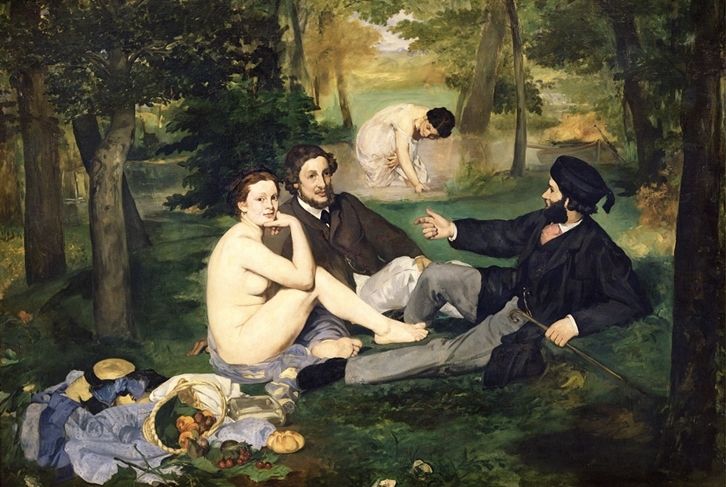Edouard Manet, Luncheon on Grass,1863
 Edouard Manet, Luncheon on Grass,1863
Edouard Manet, Luncheon on Grass,1863
The painting of Edouard Manet influenced the impressionists and his treatment of the modern subject matter inspired many. He observed the connection between form and subject, content and matter had undergone a constitutional change. Form had the equal status with the subject matter. The power of the form had surpassed to such an extent that it was an end in itself. An aesthetic revolution was in the making, one that would change the way art was judged. The concept of beauty was thus challenged, in regard to the subject matter.
Manet was controversial for both his subject matter and his the way he executed his painting,the painterly aspect. He was thus marred by the conservative critics, for they declared his subject matter lacked morals and a defined plot. The critics brashly commented on his painterly style, which they said ‘lacked power’ and was ‘impotent’.
Manet did not seek the controversy .He wanted to “Be Famous and Earn Money” according to what degas stated. He wanted to be accepted by French academy. His work the Spanish guitar player was accepted by the salon and he was awarded an honourable mention by the jury.
His work the “Luncheon on the grass” (dejeuner sur i`herbe) drew negative criticism. This work was based upon an earlier work during renaissance, but he tried to change it using modernsubject matter. He was basically trying to aim and comment upon the truth of the society, that was hid ,under the mask of sophistication and hypocrisy .The painting was regarded as aninsult rather than homage to tradition. The Renaissance master Titian had painted with asimilar approach, where he showed two nude nymphs in a pastoral setting along with twoclothed men playing musical instrument .But, the two female figures were symbolic of
mythological figures and the painting ‘Fete Champetre’ was a poetic allegory. But, what Manet had created was threatening .It give a clear glimpse what the modern life was offering.
Nudity in public space was the bitter everyday reality of the poor. Social change and acute poverty, made the poor class beautiful women as an object of pleasure at the hands of the bourgeois. Not only the world of prostitution but also the Cabre shows where nudity was exposed on the stage. His paintings provoked a reaction from the French bourgeois, who were the target of his criticism. The display of nudity in the world of art was not a new thing, but his paintings were not displayed. His paintings betray the idea of realism, it more of critically judging the action of the bourgeois. In 19th century the realist painter depicted the sour lives of the poor; they wanted to show what they believed the truth of reality was. Reality meant the social reality.
The time in which ‘Luncheon on grass’ was exhibited when nude was acceptable only in high stylised forms and was of divine subject matter. Due to rapid development and expansion in France then, which gave rise to the emerging middle class .They basically wanted to capture the changes that happening in France due to rapid industrialisation. The city was rebuilt which gave a chance to the artist to explore and to capture beauty.
The painting was composed in a way that two fully clad men in modern middle class dress while the two women, one in the front who catches the most attention is fully nude. She is recognised as a contemporary figure, sitting stark naked with the two men and suggests a picnic scene. The woman was staring at the viewer, which suggests her bold attitude that was
certainly unknown of women, at that time. It was like the truth was there in front of everyone’s eyes. The critics pronounced that the ‘Luncheon on Grass‘ was immodest, vulgar, indecent and immoral. The modern artists were embracing the radical changes in the society and were showcasing it in their works.
Representation in the process of truth seeking is never a representation of reality, but rather a representation of ideological beliefs. It was none other than a political representation, which aimed at spreading the ideological beliefs of the socialists. Political in this case meant the, strategy for communicating thoughts, views, expression and attitudes, works the cause
“impact”. This painting hit the people in the face and forced them to meet the reality. As reality, lies deep under the thick crust of sophistication.
-Akanksha Khanna